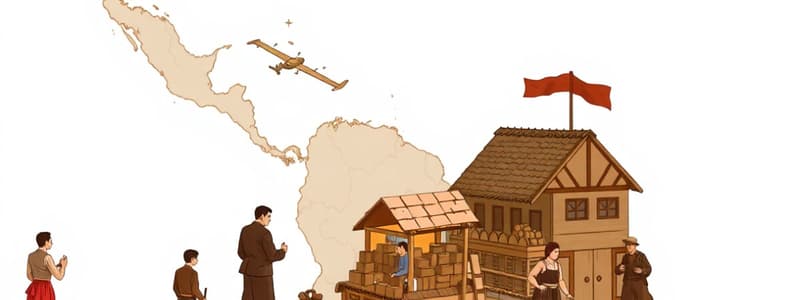Podcast
Questions and Answers
What is indicated about the economic policies mentioned?
What is indicated about the economic policies mentioned?
- They encourage free trade.
- They are widely successful.
- They focus on international relations.
- They are primarily protectionist. (correct)
What does the mention of 'protectionistio' imply about Spain's approach?
What does the mention of 'protectionistio' imply about Spain's approach?
- They seek to increase tariffs on exports.
- They promote collaboration with other economies.
- They prioritize foreign investment.
- They limit imports to boost local economy. (correct)
Which of the following is likely a consequence of the economic policies mentioned?
Which of the following is likely a consequence of the economic policies mentioned?
- Increase in foreign trade volume.
- Growth of local businesses. (correct)
- Stagnation of market prices.
- Reduction in domestic competition.
The phrase 'limit those in the supply' suggests what about the market strategy?
The phrase 'limit those in the supply' suggests what about the market strategy?
What can be inferred about the economic state of Spain based on protectionist policies?
What can be inferred about the economic state of Spain based on protectionist policies?
What role did the Dominican friars play in the context provided?
What role did the Dominican friars play in the context provided?
What is the significance of the mention of the Dominican friars in the content?
What is the significance of the mention of the Dominican friars in the content?
What was a significant issue faced by laborers mentioned in the content?
What was a significant issue faced by laborers mentioned in the content?
Which of the following best describes the atmosphere surrounding the work of the Dominican friars?
Which of the following best describes the atmosphere surrounding the work of the Dominican friars?
How did the method of transporting goods in the pre-Hispanic era persist into later periods?
How did the method of transporting goods in the pre-Hispanic era persist into later periods?
What aspect of society did the Dominican friars notably interact with based on the content provided?
What aspect of society did the Dominican friars notably interact with based on the content provided?
The content implies that the Dominican friars had an impact on which of the following?
The content implies that the Dominican friars had an impact on which of the following?
What factor influenced the degree of force that employers could exert over workers?
What factor influenced the degree of force that employers could exert over workers?
What does the content suggest about peonage during the colonial period?
What does the content suggest about peonage during the colonial period?
What was one limitation imposed on the loads carried by laborers?
What was one limitation imposed on the loads carried by laborers?
What is the impact of the decrease in numbers on the market?
What is the impact of the decrease in numbers on the market?
What is the context of the phrase 'legitimate I' in the content?
What is the context of the phrase 'legitimate I' in the content?
Based on the text, what is the main factor contributing to the decrease in numbers?
Based on the text, what is the main factor contributing to the decrease in numbers?
What is the significance of the reference to 'bloode', 'tock' and 'expeci.meatetl' in the content?
What is the significance of the reference to 'bloode', 'tock' and 'expeci.meatetl' in the content?
In this text, what does 'ud1 men' most likely refer to?
In this text, what does 'ud1 men' most likely refer to?
Flashcards
Protectionist Policies
Protectionist Policies
Economic policies designed to protect domestic industries from foreign competition by imposing restrictions on imports.
Protectionism
Protectionism
A type of trade policy aimed at increasing domestic production and employment by reducing imports through tariffs, quotas, or other barriers.
Tariff
Tariff
A tax imposed on imported goods, making them more expensive and less competitive with domestically produced goods.
Quota
Quota
Signup and view all the flashcards
Free Trade Policies
Free Trade Policies
Signup and view all the flashcards
What is a complex system?
What is a complex system?
Signup and view all the flashcards
What is systems thinking?
What is systems thinking?
Signup and view all the flashcards
What are stakeholders in a complex system?
What are stakeholders in a complex system?
Signup and view all the flashcards
What is system analysis?
What is system analysis?
Signup and view all the flashcards
What is system resilience?
What is system resilience?
Signup and view all the flashcards
Dominican Friar's Role
Dominican Friar's Role
Signup and view all the flashcards
Documenting Diverse Cultures
Documenting Diverse Cultures
Signup and view all the flashcards
Recognizing Cultural Value
Recognizing Cultural Value
Signup and view all the flashcards
Bridging Cultural Gaps
Bridging Cultural Gaps
Signup and view all the flashcards
Turning Point in Anthropology
Turning Point in Anthropology
Signup and view all the flashcards
Debt Peonage
Debt Peonage
Signup and view all the flashcards
Tamanes
Tamanes
Signup and view all the flashcards
Employer Power
Employer Power
Signup and view all the flashcards
Prevalence of Debt Peonage
Prevalence of Debt Peonage
Signup and view all the flashcards
Roots of Forced Labor
Roots of Forced Labor
Signup and view all the flashcards
Study Notes
Spain's Economic Policies in Mexico
- Mexico, as New Spain, existed to benefit Spain economically.
- Spain followed mercantilism, believing colonies should strengthen the mother country.
- Profit was the primary motivator in Spain's colonial policies.
- Spain's policies were highly protective, limiting competition from New Spain. Raw materials were to go to Spain to be processed and sold to colonists.
- Silver was the main export from Mexico to Spain.
Encomienda System
- Early colonists initially received grants of Indian labor (encomiendas).
- The encomienda system proved unsustainable, as the numbers of encomenderos declined.
- Encomiendas generally offered modest incomes.
- Native populations were often forced into labor to maintain the encomienda system.
- Enslavement of natives was common but later banned.
Forced Labor in New Spain
- The repartimiento (cuatequil) system was a system of forced Indian labor in lieu of tribute.
- Each adult male Indian had a work obligation of roughly 45 work days per year.
- Indian workers were often mistreated and underpaid.
- Labor practices varied geographically.
Mining in New Spain
- Silver mines were crucial to New Spain's economy.
- Early major discoveries were made in Zacatecas and Guanajuato.
- Mining towns developed in the north due to significant silver deposits.
- Mining was a dangerous occupation and often resulted in early death.
Agriculture and Ranching
- Agriculture was essential to New Spain's survival.
- Colonies produced many various crops for local consumption.
- Spaniards also introduced livestock, introducing a new source of protein for the settlers.
- The ranching industry spread across northern Mexico. Colonists tried to control agriculture in the colonies, and to prioritize Spanish interests, even if it was detrimental locally.
Industry and Trade
- Industrial development was suppressed to limit competition with Spain.
- Local industry existed in New Spain, but it was largely for local consumption.
- Spanish merchants regulated trade and the extraction of profit.
- Spain controlled trade routes and goods.
Results of Spanish Policies
- Spain profited heavily from New Spain's resources.
- Native populations were significantly affected.
- Economic control stifled development.
- Colonial policies were detrimental to Mexican development.
Studying That Suits You
Use AI to generate personalized quizzes and flashcards to suit your learning preferences.
Related Documents
Description
This quiz explores Spain's economic strategies in colonial Mexico, including mercantilism and the encomienda system. Discover how these policies affected native populations and the economic relationship between Spain and New Spain. Test your knowledge on the dynamics of forced labor and resource extraction in this historical context.




